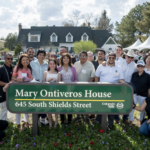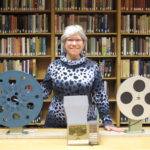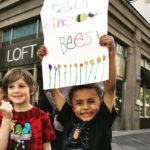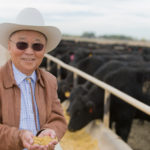Bill Guyton (B.S., ’84) was a junior majoring in agricultural business when he embarked on a summer internship with a professor from the Colorado State University’s Warner College of Natural Resources and two other students studying wildlife in Botswana, Africa.
Late one night, while the group and their guide were sleeping under the stars in the Okavango Delta, they were woken by a whistling sound. They stood and listened. Initially, it was coming from one side of their camp, but then they heard it on the other side as well.

Someone eventually turned on a flashlight to investigate and discovered a pride of lions on both sides of their camp communicating back and forth. To avert a potentially dangerous situation, their guide fired a single shot into the air to disperse the lions.
Most internships aren’t so adventurous, but the experience transformed Guyton’s life. “I was hooked after that and knew I wanted to explore the world. It really piqued my interest in environmental conservation.” Soon after, his newfound passion led him to join the Peace Corps and return to Africa. He taught agriculture and biology in a secondary school in the Democratic Republic of the Congo for two years.
“The Peace Corps was a very humbling experience,” Guyton said. “You realize the limitations of what you can do, but it helped me grow a lot as a person, and I learned so much from seeing another perspective and how different people live.” It also solidified his career path. After completing the Peace Corps, he returned to the U.S. and earned a master’s degree in agricultural economics from Michigan State University in 1991.
Guyton then formed a consulting firm in the 1990s focusing on sustainable agriculture and environmental practices and accepted assignments around the world, including the DRC, the Philippines, Sri Lanka, Jordan, Ethiopia, and several West African countries.
He credits his consulting success to his willingness to work in places other people didn’t want to go, but working in one part of the world and then moving to another was arduous. So, in 1998, Guyton became the business development director for the U.S. Grains Council, representing domestic farmers and developing export markets for barley, corn, grain sorghum, and related products. He worked closely with numerous U.S. government agencies and occasionally met with representatives from large chocolate companies, such as Mars, Inc., Nestlé, and The Hershey Company.
The Sweet Life
“I was with the Council for two years and loved it,” Guyton said, “but my true passion was tropical commodities, which really dates back to my Peace Corps days.” One of his favorite crops is cacao, the source of all things chocolate. (Cacao, pronounced “co-cow,” is the raw, unprocessed version of cocoa, but the terms are often used interchangeably.)
The 20- to 40-foot-tall trees originated in Latin America but are also grown in West Africa and Southeast Asia, where the equatorial climates are similar. Guyton was interested in improving the overall sustainability of the crop and its impacts – environmentally, economically, and socially.
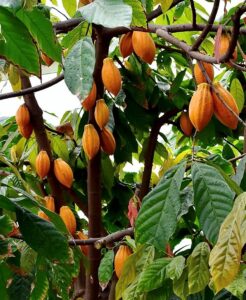
In Africa, cacao is mainly grown on small, family-run farms, so it’s difficult to organize large-scale agricultural trainings to increase productivity or combat diseases and pests, for example. Access to education is also an issue because the children of farmers often work on the farm rather than attend school even when one is available.
“I remember taking trips to West Africa, sometimes two times a month, and appreciated the hospitality of the farmers and their willingness to work with us. I was always warmly welcomed going into these communities that often had no running water or electricity.”
To address a host of issues, Guyton founded in May 2000 the World Cocoa Foundation, which became a globally recognized organization with 115 members representing 85 percent of the global chocolate industry. The foundation leverages public-private partnerships with European, U.S., and African governments and key philanthropic donors and foundations to significantly increase program investments in productivity, living conditions, and childhood education.
The WCF began an ongoing association with the Bill and Melinda Gates Foundation around the intersection of food security and sustainable cacao. “Their main interest in partnering with the private sector was to leverage the chocolate industry’s network of small-scale farmers with their foundation’s expertise in food production,” Guyton said. “The goal was to provide a more diversified cropping system for farmers and improve household incomes.”
Guyton ran the WCF for 15 years, finally stepping away in 2015 to consult again on global agricultural sustainability programs before becoming the executive director for the Fine Chocolate Industry Association in 2018. He accepted the ongoing role of senior advisor in January 2022.
Preparing for the Future
As if his plate wasn’t full enough, this past summer Guyton co-founded the Specialty Cocoa and Chocolate Associates, an alliance of independent consultants and experts addressing a cross-section of issues in the international cocoa-chocolate industry, one of which is climate change.
“Cacao grows in a narrow band about 20 degrees north and south of the equator,” Guyton said. “There are real concerns about where it can be grown in the future because it needs a lot of rain, humidity, and heat, and according to some projections, the areas where it can grow are shrinking.”
For the past twenty years, Guyton has volunteered his expertise with nonprofits, including the Alliance to End Hunger. In 2018, he supported the creation of the International Experiences in Conservation Leadership scholarship at CSU’s Warner College of Natural Resources. The fund provides summer scholarships to graduate students planning to complete their Conservation Leadership through Learning capstone project abroad in a developing country. Thus far, eight students have received $17,000 toward their internships.
Guyton knows the value of such programs firsthand; a similar program changed the course of his life. “These internships are so important because they enable the next generation to explore the world, and they will become our future leaders.”











